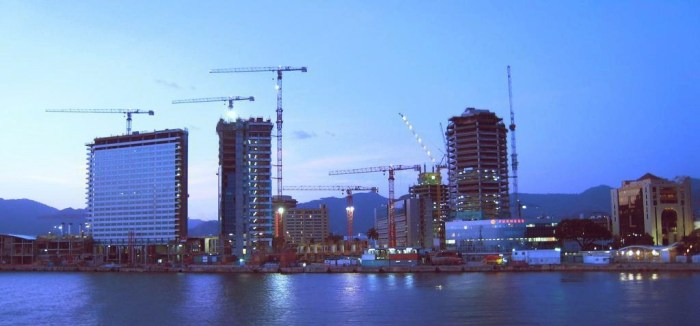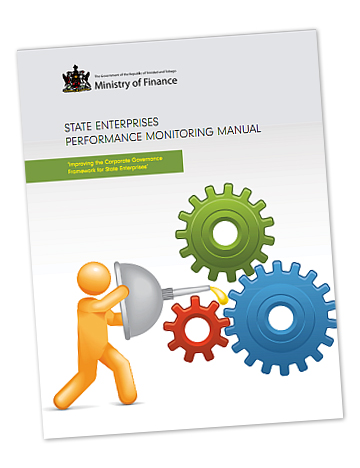
I call this the Season of Reflection, being the two-month period starting with Emancipation Day on 1 August, centred by our nation’s Independence on 31 August and closing with Republic Day on 24 September. To me that is a compelling sequence in which those days of national importance are celebrated. It is a good time for reconsidering the role Conscious Citizens should play in the process of National Development.
Our country is relatively tiny, at 5,128 square kilometres, and its population density is relatively high, at an estimated 239 persons per square kilometre. I say estimated, since those figures effectively yield a population of 1.225 million and it seems to me that our population is far higher, but that aspect is for another column. What concerns me here are the implications of our high population density in terms of our physical development.
Given that over 60% of our land is effectively alienated by physical factors such as its being swampy or heavily forested, there are in fact only very limited areas readily available for development. Place that fact alongside the concentrations of economic activity/population and the growing environmental awareness and there is cause for a pause.
The recent past has been a series of large-scale, impactful developments carried out in our small country with little or no regard for citizens’ input or review. The established pattern is the creation of big development plans, behind closed doors and in secret, to be announced at the most opportune moment for publicity purposes. The Citizen, who ought to be at the centre of our Republic’s development, would seem to have been ‘re-purposed’ into a mere audience. The factors I have outlined above mean that the present way of proceeding is no longer going to be acceptable.
The most glaring example of this obstinate and wasteful impulse to develop, at literally any cost, is the large-scale redevelopment of POS by the previous administration. The Patrick Manning/UDECOTT/Calder Hart axis was responsible for rebuilding a huge proportion of our capital with no consultation whatsoever. What is worse and as confirmed at Calder Hart’s cross-examination at the Uff Enquiry, every single project was commercially unfeasible. According to Hart, only UDECOTT’s so-called flagship project, the International Waterfront Project, was subject to a feasibility test, which was revealed, under oath, to have been entirely rigged. Bogus.
The 17th recommendation of the Uff Enquiry was –
- User groups and other interest groups should be properly consulted on decisions regarding public building projects, to ensure that relevant views can be expressed at the appropriate time and taken into account before decisions are made. (Emphasis mine.)
I maintain my view that UDECOTT has not been adhering to that standard, and despite its many statements to the contrary. That failure or refusal by UDECOTT was the issue settled in ‘The Uff Bluff’, published in this space on 8 January 2014, so that Uff recommendation is an important standard to which we should aspire in these areas.
In relation to the controversial Invader’s Bay project, a serious aspect of improper official conduct has been the failure or refusal of the Ministry of Planning & Sustainable Development to host even one Public Consultation. This is unacceptable since there are Public Consultations on King’s Wharf redevelopment proposals in San Fernando; the South-West Peninsula Growth Pole; the proposals for City status for Chaguanas and so many other issues. There is no justification for this blatant attempt to develop Invader’s Bay without public input.
Next we come to the sharpest example of them all, the actions of the Highway Reroute Movement (HRM) on the controversial Debe-Mon Desir segment of the Point Fortin Highway. That issue came to the fore during the November 2012 hunger strike by the HRM’s leader, Dr. Wayne Kublalsingh, intended to force a State review of the implications of that segment of highway. That hunger strike was only broken by both sides’ acceptance of the Civil Society proposal for an independent review of the issues in contention. That proposal was made by the JCC, the T&T Transparency Institute, Working Women for Social Progress and the Federation of Independent Trades Unions and NGOs (FITUN). The review was conducted over a 60-day period by a 19-member team under the Chairmanship of then Independent Senator Dr. James Armstrong and it is all here.
 After a prolonged series of legal battles on the point, the Armstrong Report was finally accepted into evidence in the High Court case between the HRM and National Infrastructure Development Company Ltd. (NIDCO) on 10 July 2014. The HRM has now lost in the Appeal Court in its attempt to have the Court order a stop to work on the disputed segment and it is not clear whether or not the Appeal Court decision will be appealed via the Privy Council.
After a prolonged series of legal battles on the point, the Armstrong Report was finally accepted into evidence in the High Court case between the HRM and National Infrastructure Development Company Ltd. (NIDCO) on 10 July 2014. The HRM has now lost in the Appeal Court in its attempt to have the Court order a stop to work on the disputed segment and it is not clear whether or not the Appeal Court decision will be appealed via the Privy Council.
The reality is that the Armstrong Report is the first time a major State-sponsored development has been the subject of an independent review at the instigation of private citizens, with the State making a substantial financial contribution to the costs. The entire HRM episode represents a notable high-water-mark in this struggle for proper citizens’ participation in national development.
As in so many other episodes, the entire HRM issue has become pointedly political, with pronounced positions being taken. Some people have taken the position that the HRM’s concerns were definitely out-of-place, given the traffic woes suffered by people living in that South-Western part of Trinidad. Those people were anxious to have the political administration and the Courts dismiss the Armstrong Report.
Just consider the position of Dr. Keith Rowley, who stated in March 2014 his intention to implement the ‘Rapid Rail Project’ if he is elected Prime Minister. Rapid Rail was one of the heavily-criticised projects which had been proposed by the previous administration and to his credit, Rowley has said that proper feasibility tests would be carried out before proceeding with this, the largest single project ever proposed in our nation, at an estimated cost in the region of $20 Billion.
The important point here is that we need to keep sight of the important lesson of the HRM episode, that an independent, State-funded review of large-scale development projects is in our collective best interest. The HRM episode is still ‘in play’, but a critical aspect of that main lesson is that the review must be carried out before decisions are taken, as recommended by Uff.
The people must have their say, decisions must be fact-based and the public servants must do just that, serve the public. That has to be our goal.
SIDEBAR: PUBLIC CONSULTATION
Excerpted from the 19 May 2014 High Court decision in the Charlotteville Beachfront Movement case on the issue of Public Consultation –
At para 66-
- R v Secretary of State for Social Services, ex parte Association of Metropolitan Authorities [1986] 1 All ER 164, where Webster J stated-
“…in any context the essence of consultation is the communication of a genuine invitation to give advice and a genuine consideration of that advice…it must go without saying that to achieve consultation sufficient information must be supplied by the consulting to the consulted party to enable it to tender helpful advice. Sufficient time must be given by the consulting to the consulted party to enable it to do that, and sufficient time must be available for such advice to be considered by the consulting party…”- Also, the case of R v North and East Devon Health Authority, ex parte Coughlan [2000] 3 All ER 850, where Lord Woolf stated:
“It is common ground that, whether or not consultation of interested parties and the public is a legal requirement, if it is embarked upon it must be carried out properly. To be proper, consultation must be undertaken at a time when proposals are still at a formative stage; it must include sufficient reasons for particular proposals to allow those consulted to give intelligent consideration and an intelligent response; adequate time must be given for this purpose; and the product of consultation must be conscientiously taken into account when the ultimate decision is taken…”
At para 71-
- In Fishermen and Friends of the Sea v The Environment Management Authority and Another [2006] 2 LRC 384, Lord Walker at para 28, emphasizing the need for public consultations, indicated that –
“Public consultation and involvement in decisions on environmental issues are matters of high importance in a democracy.”

 An additional enquiry has to be raised on the particular instances where the State is paying a rent for property which remains unoccupied. The same details listed above need to be sought in those cases, but in addition, we need to be told why those properties are still unused. A great concern was raised recently on #One Alexandra, which concern was mostly justified in my opinion, but the fact is that it is not the only one. The public needs to be told the full extent to which the State pays rent for unoccupied offices.
An additional enquiry has to be raised on the particular instances where the State is paying a rent for property which remains unoccupied. The same details listed above need to be sought in those cases, but in addition, we need to be told why those properties are still unused. A great concern was raised recently on #One Alexandra, which concern was mostly justified in my opinion, but the fact is that it is not the only one. The public needs to be told the full extent to which the State pays rent for unoccupied offices.




 The JCC has been pressing for the implementation of the Uff Report recommendations and the restoration of the Enquiry website. Those efforts have ranged from the Attorney General, who directed us to the Minister of Justice, to the then Minister Volney who ignored our three letters on the matter – see
The JCC has been pressing for the implementation of the Uff Report recommendations and the restoration of the Enquiry website. Those efforts have ranged from the Attorney General, who directed us to the Minister of Justice, to the then Minister Volney who ignored our three letters on the matter – see  But the current concern goes beyond the ongoing Couva Children’s Hospital, since UDECOTT is playing a leading role in the Invader’s Bay development. In December 2013, UDECOTT published
But the current concern goes beyond the ongoing Couva Children’s Hospital, since UDECOTT is playing a leading role in the Invader’s Bay development. In December 2013, UDECOTT published  In response to a full page UDECOTT advert (embedded below) in response to my article “
In response to a full page UDECOTT advert (embedded below) in response to my article “



 Apart from these points, there is now the fact that the SEC has made Orders in respect of Contraventions of the Securities Industry Act 1995 and the Securities Industry Bye-Laws 1997. Those Orders are in relation to the failure of these huge State-owned Enterprises to publish their accounts –
Apart from these points, there is now the fact that the SEC has made Orders in respect of Contraventions of the Securities Industry Act 1995 and the Securities Industry Bye-Laws 1997. Those Orders are in relation to the failure of these huge State-owned Enterprises to publish their accounts –